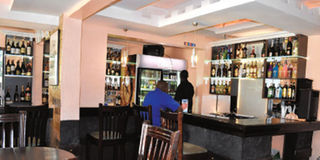New Bill on alcohol in Parliament

PHOTO | FILE It will be criminal to use a sports personality to endorse an alcoholic drink in proposed law.
What you need to know:
- If passed into law, harsher regulation will bring in more institutions and align current Act with provisions of the current Constitution
A push to tighten beer regulation is underway in a proposed law currently before Parliament. If passed into law, the Alcoholic Drinks Control (amendment) Bill, 2012 will see the introduction of new regulations and institutions not contained in the current Alcoholic Drinks Control Act, 2010.
The Bill, which has been proposed by Naivasha Member of Parliament John Mututho also wants to align the existing law to the provisions of the Constitution.
The proposed law aims at making it easy to implement the existing Act, which has been faced with a number of challenges since it came into effect in 2010.
“This Bill aims to amend the Alcoholic Drinks Control Act, 2010 so as to make it conform to the practical challenges in implementation arising out of its enactment and implementation. Secondly, the Bill seeks to harmonise the Alcoholic Drinks Control Act, 2010 with the provisions of the new Constitution,” reads part of a memorandum accompanying the Bill.
Among new regulations that will come into effect if the Bill is passed into law is the creation of a five member Alcoholic Drinks Promotions Regulation Committee which will consist of representatives from the Kenya Film Classification Board, the Media Council of Kenya, the Betting Control and Licensing Board and one appointee of the cabinet secretary experienced in matters related to media and communications.
The Bill makes it illegal for any person to promote consumption of an alcoholic drink by offering free drinks. While the existing law discourages promotion of any alcoholic drink in such a manner as to encourage consumption, it fails to specify what consists of such promotion.
In regard to advertising alcoholic drinks, if the Bill becomes law, it will be illegal to carry out promotions of alcoholic drinks by way of outdoor ads in residential areas or within a distance of 300 metres from learning institutions of persons below the age of 18.
However, the proposed law provides that the County Alcoholic Drinks Regulation Committee may issue a licence to a premise located within three hundred metres of learning institutions only if the premise is secured by a physical or non transparent barriers that ensures zero visibility of the premise.
In the proposed law, broadcast promotions of alcoholic drinks shall not be carried in any electronic media between 6 o’clock in the morning and 10 o’clock at night.
It will be criminal to use a sports personality to endorse an alcoholic drink or paint a residential building with the name of an alcoholic drink or its manufacturer.
Abolishment of office bars
Once enacted, the proposed law will also see the abolishment of office bars as it make it illegal for anyone to sell alcohol in any workplace, office, factory, public park and public transport vehicles among a host of other venues.
This is in addition to a new clause that prohibits the sale of alcohol during two days prior to the date of the General Election or in areas subject to a by-election.
Under the proposal, manufacturers of alcoholic drinks will be required to display health warning messages in the stipulated character and font sizes depending on the size of the alcoholic drink’s package.
For instance, in packages of between 250 and 475 millilitres, characters will have a height of 2 millimetres and a font of 9 points while warnings in bigger packages of over 5 litres will have characters with a height of 6 millimetres and a font of 26 points.
The Bill introduces 10 new licences which will be used to determine the time intervals upon which an outlet can legally sell alcoholic drinks.
Since its enactment, the existing alcoholic drink’s law has aroused mixed reactions from the various stakeholders with manufacturers and bar owners strongly opposed to it, citing it as an avenue to limit beer sales and reduce profitability of the entertainment industry.
Therefore, the proposed amendments are bound to generate a new wave of opposition from industry players.
“The focus should be on illegal brewers. The regulations will definitely hurt legitimate brewers who need to create awareness on new brands,” said Mrs Tabitha Karanja, managing director of Keroche Breweries.




